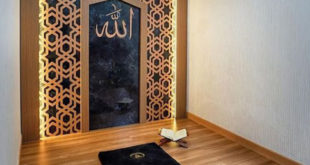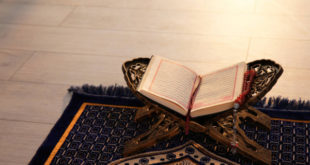Q: If a woman experiences haidh (menses) whilst sitting in i’tikaaf, what is the condition of her i’tikaaf? A: Her i’tikaaf will break. الباب السابع في الاعتكاف لا بد من معرفة تفسيره وتقسيمه وركنه وشروطه وآدابه ومحاسنه ومفسداته ومحظوراته أما تفسيره فهو اللبث في المسجد مع نية الاعتكاف كذا في …
Read More »Recent Posts
June, 2012
-
16 June
Manner of I’tikaaf for Women
Q: How should a woman carry out i’tikaaf in her home? A: A woman should specify a place in her home where she will make i’tikaaf. Thereafter, for the entire period of i’tikaaf she should not leave the place of i’tikaaf for any reason except for making wudhu (when her wudhu …
Read More » -
16 June
I’tikaaf for Women
Q: Where should a woman sit for i’tikaaf? A: A woman should sit for i’tikaaf in her home. ( أو ) لبث ( امرأة في مسجد بيتها ) (الدر المختار مع رد المحتار, الفتاوى الهندية 1/211) Answered by: Mufti Zakaria Makada Checked & Approved: Mufti Ebrahim Salejee (Isipingo Beach)
Read More » -
16 June
Time of Nafl I’tikaaf
Q: At which time can one sit for nafl i’tikaaf? A: Nafl I’tikaaf is not restricted to any time. Whenever one remains in the musjid with the intention of i’tikaaf, nafl i’tikaaf will take place. ( وأقله نفلا ساعة ) من ليل أو نهار عند محمد وهو ظاهر الرواية عن …
Read More » -
16 June
Fasting While Sitting for Waajib I’tikaaf
Q: Is it necessary that waajib i’tikaaf be carried out whilst fasting? A: It is necessary. ( وهو ) ثلاثة أقسام ( واجب بالنذر ) بلسانه وبالشروع… ( وشرط الصوم ) لصحة ( الأول ) اتفاقا وقال الشامي: قوله ( وشرط الصوم لصحة الأول ) أي النذر حتى لو قال …
Read More »
-
The Lofty Position of Hazrat Abu Ubaidah (radhiyallahu ‘anhu) in the Sight of Hazrat Abu Bakr (radhiyallahu ‘anhu)
The Lofty Position of Hazrat Abu Ubaidah (radhiyallahu ‘anhu) in the Sight of Hazrat Abu …
Read More » -
Rasulullah (sallallahu ‘alaihi wasallam) Practically Showing to the Ummah the Esteemed Position of Hazrat Abu Ubaidah (radhiyallahu ‘anhu)
-
Fear of Allah Ta’ala
-
The Quality of Consideration for Others in the Life of Hazratjee (rahimahullah) – Part Two – Adherence to The Sunnah – Part 46
-
The Abstinence of Hazrat Abu Ubaidah (radhiyallahu ‘anhu) from the Wealth of the World
-
Receiving Seventy Rewards
Hazrat Abdullah bin Amr bin Aas (radhiyallahu ‘anhuma) reported, “Whoever sends salutations upon Nabi (sallallahu ‘alaihi wasallam) once, Allah Ta‘ala and His angels will send seventy mercies and blessings upon him in return of his one Durood. Hence, whoever wishes to increase his Durood should increase it, and whoever wishes to decrease his Durood should decrease it (i.e. if he wants to earn great rewards, then he should increase his Durood).”
Read More » -
Increase in Sustenance
-
The Reward of Fasting on the Day of Arafah
-
The Angel that Stands at the Blessed Grave of Hazrat Rasulullah (sallallahu ‘alaihi wasallam) to Convey the Durood of the Ummah
-
Reciting Durood when Entering the Musjid
-
Sunnats and Aadaab which every person needs to adhere to in his individual life – 7
18. In Islam, there are special occasions where one is able to acquire special blessings …
Read More » -
Sunnats and Aadaab which every person needs to adhere to in his individual life – 6
-
Sunnats and Aadaab which every person needs to adhere to in his individual life – 5
-
Sunnats and Aadaab which every person needs to adhere to in his individual life – 4
-
Sunnats and Aadaab which every person needs to adhere to in his individual life – 3
-
Hazrat Ali (radhiyallahu ‘anhu) – Part Forty-One – Being Sent by Rasulullah (sallallahu ‘alaihi wasallam) to Level the Graves, Destroy Idols and Erase Pictures
Hazrat Ali (radhiyallahu ‘anhu) reports that on one occasion, Rasulullah (sallallahu ‘alaihi wasallam) attended a …
Read More » -
Rasulullah (sallallahu ‘alaihi wasallam) Approving of the Verdict of Hazrat Ali (radhiyallahu ‘anhu) – Part Forty
-
The True Ulamaa – Hazrat Ali (radhiyallahu ‘anhu) – Part Thirty Nine
-
Du‘aa for Assistance in Settling Debts – Hazrat Ali (radhiyallahu ‘anhu) – Part Thirty Eight
-
The Concern of Hazrat Ali (radhiyallahu ‘anhu) regarding Business being Conducted According to the Islamic Principles – Part Thirty Seven
 Ihyaaud Deen An Effort to Revive Deen in Totality
Ihyaaud Deen An Effort to Revive Deen in Totality

















































































